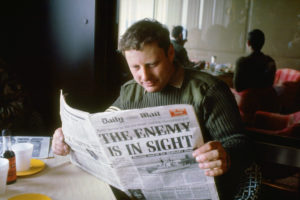The Second World War is Great Britain’s great daddy issue. It is with us from infancy, squatting immovably as a formative weight and wound. We either resent its example or strive to match it, coughing up Blitz spirit and slapping on a Churchillian grimace at times of national fracture. It’s a ready excuse for our national convulsions, a psychological flaw to explain away our failures and embarrassments.
However, as Anthony Barnett observed of the War’s second son after Suez, the Falklands, history doesn’t just repeat as tragedy and farce, but also as spectacle, as media event. And if the War (it is still just about a definite “the”) is our national creation myth, it only became so once we started broadcasting it on repeat, sublimating violence and trauma into a televisual parade of trumpets and valour.
The mythologising started straightaway. Churchill’s words urged us into new conceptions of national prowess, his classical inflections designed to flatter us into thinking we were the Athenians and he our Thucydides. Soon his personal sense of moral destiny became a collective triumph, a pageant to be inspiringly viewed from the cheap seats of austerity Britain. And nowhere was the spectacle more spectacular than in the British war film. Enlisting Steve McQueen, Richard Attenborough and Richard Burton, we turned our parents into hero-warriors — better, into Hollywood stars. For the children of the Fifties and Sixties, Daddy’s war could become theirs too. The testament of a previous generation turned entertainment for the next.
However, to judge from the fate and Zimmer frame of Michael Caine in his new (and possibly last) film The Great Escaper, the war film is dying on its feet. And the Second World War is now very much a grandaddy issue, possibly even just an issue for executors, morticians and undertakers. Caine plays Bernie Jordan, a D-Day veteran who absconds from his care home to attend the 70th anniversary of the landings. If it sounds too twee to make up, it is — the real Bernie became an overnight celebrity after his trip in 2014, before his death six months later. Genuinely unbelievable, though, is the fact that this is one of two films that will retell his story to be released this year, with the second inadequately substituting Sir Michael for Pierce Brosnan. The snout of the British culture industry has evidently sniffed out a winner.
The Great Escaper sparely retells Bernie Jordan’s weekend Odyssey, every detail designed to pull delicately on the heartstrings of the national psyche. There’s Bernie’s wartime romance with Irene (the late Glenda Jackson), consummated in flashback after a shuffle at the local swing night, and still strong after 70 years. There’s Bernie’s reconciliation with some pacified Germans in a café overlooking Sword beach. “What a waste,” he will cry, in a foreign field lined with white graves. But the film need only prod its audience with clichés. We are prepped from early-learning to receive them. The wash of waves and Michael Caine, flat-capped, staring out to sea beneath a commemorative D-Day banner, his glassy eyes blinking, his aged mind remembering. This is what a war hero looks like.
But Caine’s presence, as well as the film’s title, places The Great Escaper at odds with a very different lineage of war films, one of pluck and daring. Despite all the redcoats and pith helmets, Caine’s first picture Zulu leant directly on the beleaguered British underdog myth of 1940. And he went on to form part of the Shakespearean ensemble behind Battle of Britain, that epic Airfix commercial of 1969. For the other, still vaguely watchable productions from the time, see The Guns of Navarone, Ice Cold in Alex, The Great Escape itself and obviously Where Eagles Dare. (For a refresher, turn on ITV4 at 4pm this Sunday afternoon, or in fact any Sunday afternoon.)
All memoirs of the Sixties recall the intensity of this saturation. “I saw a film today, oh boy,” John Lennon sang in 1967. “The English Army had just won the war.” Geoff Dyer, born 1959, claims that before he was 15 he had only seen Disney cartoons, Alastair Maclean adaptations and a few other war and action movies. “I didn’t know films were made out of anything else,” remembered Christopher Hitchens. And this was part of a more general mania of cultural reproduction that gripped the supposedly Swinging nation, particularly among the young. Just as the war economy wound down, as actual conscription was coming to an end, culture was rearming. Kids read War Picture Library comics, the national equivalent to Marvel. Every boy was accompanied by a portable, idealised Unknown Soldier — at their peak there were four Action Men for every three boys in the country.
While the stories were not always uncomplicated, you never forget who the villains are, and who will and should eventually triumph. This was a Technicolor Second World War, gun-slinging and cocksure. It was what Britain needed. “We won the war… or did we?” went the cynical grumble as imperial pink faded from the map and the Union Jack was lowered East of Suez. But only the most reactionary portions of the British Right actually regretted fighting it. We’d lost our status — but we’d gained a cinematic universe to play heroes in, made all the more believable by being roughly justified. Few of these films mentioned the Holocaust or Nuremberg, but they didn’t have to. You knew the German characters were evil before you knew why — and you knew that your country had done something towards stopping them.
But, much like a child growing to see its father in a different light, our perspective on this past has altered. The war-film industry isn’t dead, but it is changed and chastened from those swashbuckling days. The self-confident silliness we once gorged on is gone. Instead, we’re drawn to the conflict’s murkier corners, background actors such as Turing and Oppenheimer who were as much victims of the War as they were its victors. The best war film of the last two decades, Dunkirk, turned the battle into an aesthetic masterpiece, a ticking set-piece of cold realism, with only a petit four of Churchilliana at the end to sweeten the horror. And, when we return to our wartime leader, the best we can do is turn Churchill into Gary Oldman’s pot-bellied pastiche, just at the very moment that his historical reputation needed intelligent defence, not sentimental reinforcement.
The real Bernie Jordan endured the same sentimentalisation, becoming advertising copy for P&O Ferries and a grinning, geriatric front-page sensation (a dehumanising process that The Great Escaper creditably critiques). The ultimate embarrassment, however, history repeating itself as spectacle and farce, was to come in 2020, when a cabin-feverish media seized upon Captain Tom Moore, a veteran of Burma’s “Forgotten Army” who had started walking across his garden to raise money for NHS charities. Tom became the face of a terrifying convulsion of Second World War parodism in British society, proving beyond doubt that it is still our only serviceable memory of national unity.
But how long until that memory fades? Harry Patch, “the last Fighting Tommy” from the war before, died only five years before Jordan’s great escape — and the death of the last D-Day witness, if not the last Second World War veteran, cannot be far off. Tribute to the obsessive qualities of internet historians everywhere, a Wikipedia page lists dozens of “notable” survivors in various states of decay, many in their second century. Jordan may not be the last to be immortalised in film (a Captain Tom biopic is in production), but the sense of leave-taking in The Great Escaper — bittersweetly conveyed by Caine and Jackson — gestures towards the War’s uncertain legacy as it moves irretrievably beyond living memory.
No doubt those generic Churchillian emphases — “tears and sweat”, “the beaches” — will kick about the English language for another century, like those moth-eaten scraps of Tennyson that still retain some anonymous poetic charge. Perhaps they will even be reworked into a khaki Henriad by some distant Shakespeare. But the magic of those grand metonyms — “Overlord”, “Alamein” — is already gone for most people. Soon they will seem as antique as Wellington’s rearguards in the Peninsular Campaign.
Clearly, popular feeling is still swayed by memories of the finest hour, by a faith that we’re capable collectively of doing the right thing. But we see it ever more cynically. When Boris Johnson bustled off to Ukraine to tour bomb sites and inspect sandbags, we all knew whose silhouette he was shrouding himself in. Yet at some point in the future, we won’t recognise it at all. We will see only the transparent present, unmoored from the epic past it once aspired to.
Disclaimer
Some of the posts we share are controversial and we do not necessarily agree with them in the whole extend. Sometimes we agree with the content or part of it but we do not agree with the narration or language. Nevertheless we find them somehow interesting, valuable and/or informative or we share them, because we strongly believe in freedom of speech, free press and journalism. We strongly encourage you to have a critical approach to all the content, do your own research and analysis to build your own opinion.
We would be glad to have your feedback.
Source: UnHerd Read the original article here: https://unherd.com/



